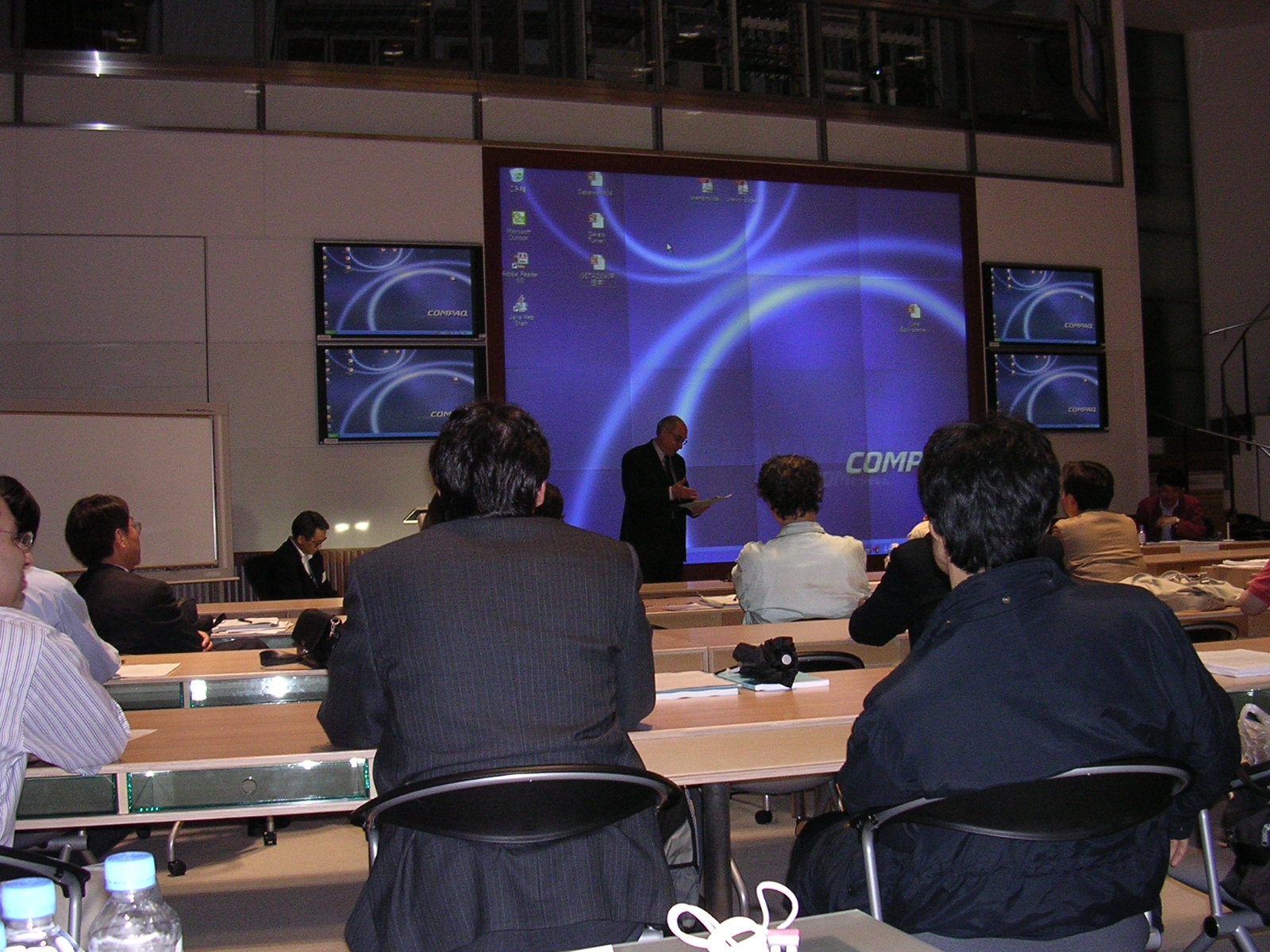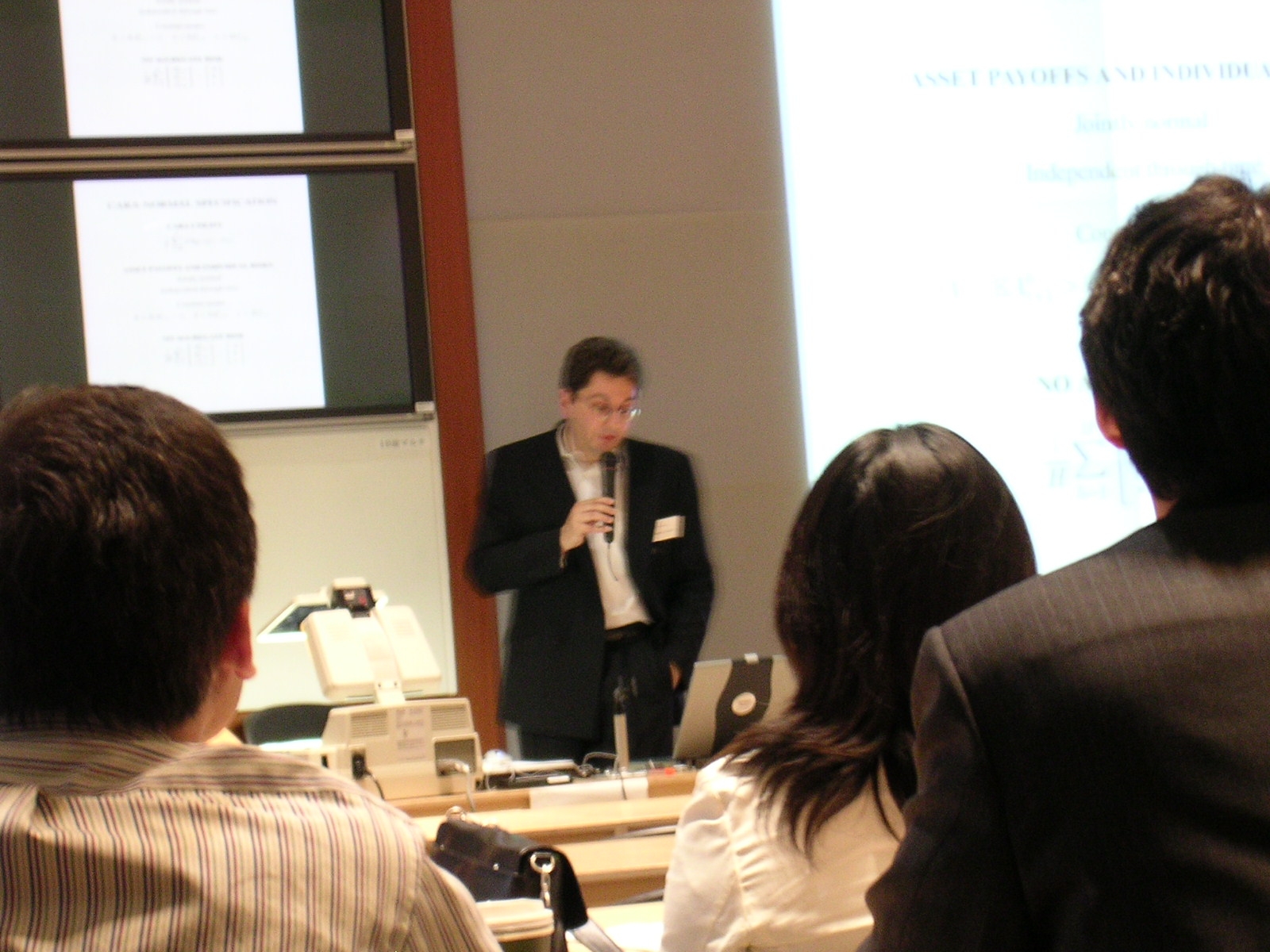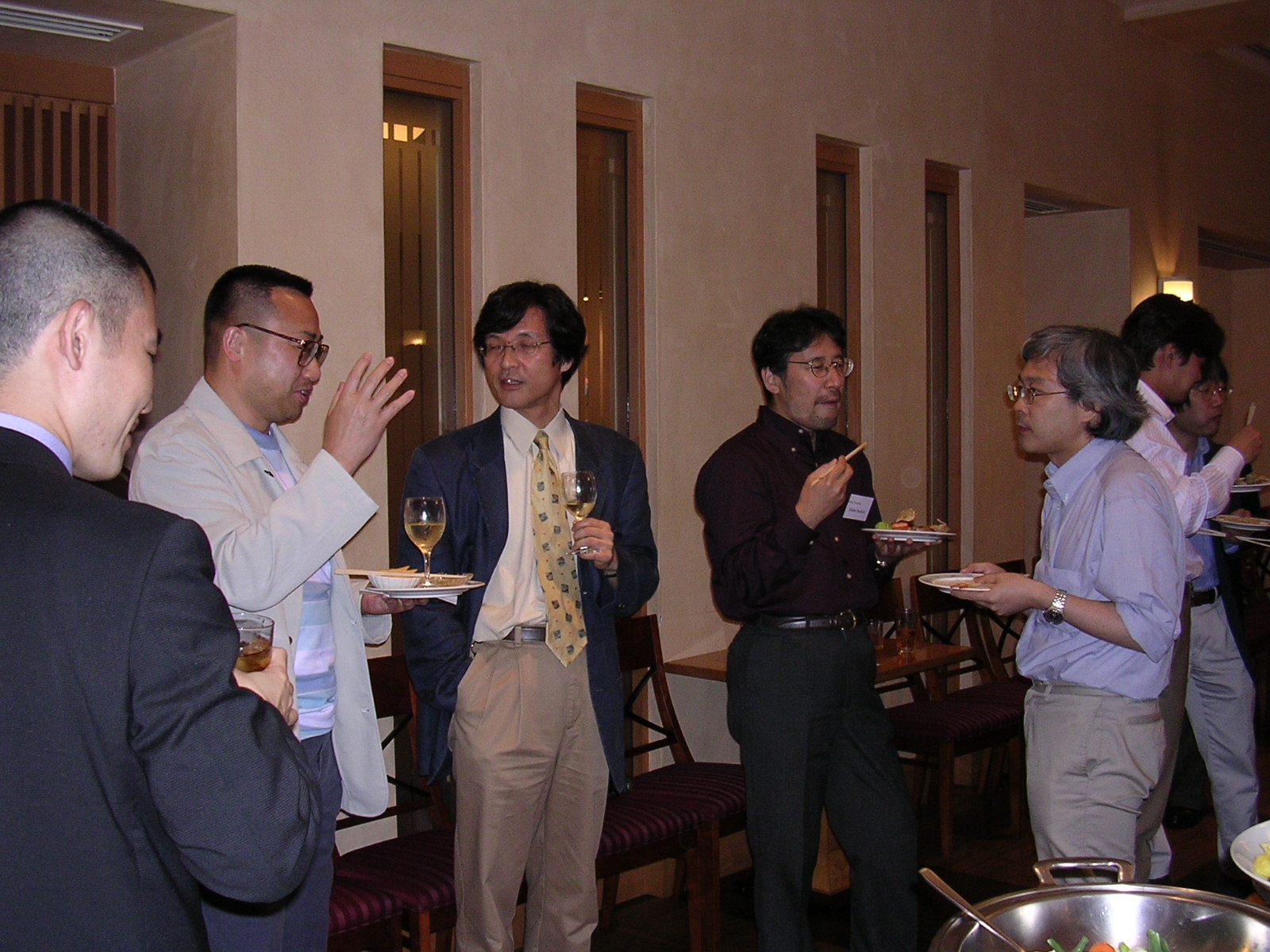CIRJE Conferences 2004
- Science Council of Japan Simposium "Downturn of Japanese Economy and Possible Future Reforms" March 16, 2005
- Economics of Collusion: Evidence from Korea and Japan January 17, 2005
- The Fifth Annual Japan Project Meeting September 1-2, 2004
- International Conference: "The Asian Crisis VI, Financial Crisis and Economic Growth" August 30-31, 2004
- COE Mini ConferenceAugust 13, 2004 * Conference is held in Japanese
- Northwestern University - University of Tokyo Conference on Sources and Propagation of Macroeconomic Impulses July 9-10, 2004
- Fifteen Annual East Asian Seminar on Economics June 25-27, 2004
- The First Asian Workshop on General Equilibrium Theory (GETA2004) June 11, 2004
Science Council of Japan Simposium
"Downturn of Japanese Economy and Possible Future Reforms"
- Organized by:
Science Counsil of Japan
"Empirical Analysis and Design of Economic Systems",
Ministry of Education Grant-in-Aide for Scientific Research on Priotrity Areas - Co-organized by: CIRJE
- Venue: Science Counsil of Japan, Roppongi, Tokyo
- March 16, 2005
- Detailed Information of the Conference
On March 16, CIRJE's scientific research project, Empirical Analysis and Design of Economic Systems, jointly with the Science Council of Japan held a symposium entitled DOWNTURN OF JAPANESE ECONOMY AND POSSIBLE FUTURE REFORMS. In his presentation "A supply side explanation of the lost decade", Professor Fumio Hayashi of University of Toyo examined macro economic aspects of Japanese economy after 1990 emphasizing the drop of total factor productivity. By presenting "People, schools, and workplaces: structural change of labor market in 1990's and its future," Professor Kenn Ariga of Kyoto University analyzed job market problems to which contemporary high school graduates face. In his talk "Institutional reforms of 21 century: From 'safety, assurance and equality' to 'competition, freedom and variety'," Professor Masahiro Okuno-Fujiwara explained how coercion of long-term relationship harms the incentives for building and maintaining trust. Lively discussions with audience followed the presentations.
Economics of Collusion: Evidence from Korea and Japan
- Organized by:
The Research Center for the Relationship between Market Economy
and Non-market Institutions (CEMANO),
a Center of Excellence (COE) program in the Graduate School of Economics, University of Tokyo - Co-organized by:
The Center for Corporate Competitiveness
at Seoul National University,
Competition Policy Research Center,
Fair Trade Commission of Japan, and CIRJE - January 17, 2005
- Faculty Meeting Room on the 6th floor of Economics Building, The University of Tokyo
- Organizer: Yasuyuki Sawada (University of Tokyo)
PROGRAM
- 13:00-13:10
- Introduction
- 13:10-14:50
- Session 1:
"Econometric Damage Estimation from the Bid Rigging in the Korean Military Oil Procurement Auctions during 1998-2000"
Sonku Kim, Inkwon Lee, Keunkwan Ryu, and Sang-Seung Yi - 14:50-15:00
- Tea break
- 15:00-16:40
- Session 2:
"An empirical analysis about Japanese 'Dango'"
Toshiko Suzuki, Yuji Kimura, and Noriyuki Yanagawa - 17:30-20:00
- Reception at Sanjo Kaikan
The Fifth Annual Japan Project Meeting (NBER/CIRJE/EIJS/CEPR)
- Co-organized by: NBER, EIJS, CEPR and CIRJE
- Organizers:
Magnus Blomstrom (Stockholm School of Economics)
Jennifer Corbett (Australian National University)
Fumio Hayashi(CIRJE, University of Tokyo)
Anil Kashyap (University of Chicago) - September 1-2, 2004
- Asian Development Bank Institute in Kasumigaseki Building
The Sixth Annual CIRJE Japan Project Meeting, co-organized with the NBER (National Bureau of Economic Research, based in the U.S.), the EIJS (European Institute for Japanese Studies, based in Sweden), and the CEPR (Center for Economic Policy Research, based in England), was held on September 1 and 2, 2004, at the Asian Development Bank Institute in the Kasumigaseki Building. More than 80 academics, private-sector economists, journalists, and policymakers from within and outside Japan participated. Eight papers were presented. Economists from Japan, Europo, and the US presented their in-house macroeconomic model to examine monetary policy under the zero-interest rate bound. Mr. Katsuya Okada, president of the Democratic Party, gave a lunchtime speech.
The Asian Crisis, VI: Financial Crisis and Economic Growth
- Co-organized by:
CIRJE, Faculty of Economics, University of Tokyo
Reserach Center for International Economics, University of Washington - August 30-31 2004
- Lecture Hall B (No.2) on the 3rd floor of Economics Building, University of Tokyo
- Organizers: Shin-ichi Fukuda (Co-Chair) (University of Tokyo, Japan), Kar-Yiu Wong (Co-Chair) (University of Washington, USA), Joshua Aizenman (UC Santa Cruz, USA), Chung Mo Koo (Kangwon National Universtiy, Korea), Jeff Chien-Fu Lin (National Taiwan University, Taiwan), Ramkishen S. Rajan, University of Adelaide, Australia), Thomas D. Willett (Claremont Graduate University, USA)
- Conference Homepage
This conference is a part of our research project to construct new theories of international finance and to examine their empirical relevancy in East Asia. The project tries to provide both theoretical and empirical analysis on what system is desirable for the current international finance environments in East Asia. We particularly focus on the analysis of "crisis in East Asian money markets". The Asian crisis in 1997 called for a large number of papers that would provide a prescription of possible crises in the future. We have, however, not reached a definitive conclusion on what system is desirable for the current East Asian economy.
The conference follows our previous conferences "The Asian Crisis III: The Crisis and the Recovery" in Tokyo in 2001, "The Asian Crisis IV: The Recovery and the Rest of the World" in Taiwan in 2002, and "The Asian Crisis V: New Challenges and Opportunities for the Post-Crisis Asia" in Korea in 2003. The conference was successful with more than 35 participants from all over the world. They include Joshua Aizenman (UC Santa Cruz, US), John Fernald (Fed Reserve Bank of Chicago, US), Kar-yiu Wong (U of Washington, US), and Takatoshi Ito (University of Tokyo).
Fifteen Annual East Asian Seminar on Economics
- Co-organized by: NBER/TCER/University of Tokyo
- Organizer:
Takatoshi Ito (University of Tokyo and NBER)
Andrew Rose (UC, Berkeley and NBER) - June 25-27, 2004
- Academy Hills
The fifteenth annual East Asian Seminar on Economics (EASE 15) was held in Tokyo, Japan on June 25-27.
EASE-15 was organized around the topic of "Monetary Policy under Very Low Inflation Rates." Until about a decade ago, this would have seemed to be an issue of only academic - meaning negligible - interest. However, the advent of extremely low inflation since the late 1990s has brought this macroeconomic issue to the forefront of policy discussions. As usual, academic interest has responded to this demand with a lag. Academic interest in the area is particularly high in Asia, for a number of reasons.
First and foremost, a number of important Asian countries have experienced deflation in the last fifteen years. Japan is perhaps the most prominent of these countries, but mainland China, Taiwan, and Hong Kong amongst others have also experienced persistently negative inflation rates. Some of these episodes are the result of fast growth on the supply side of the economy, which seems to have relatively benign effects. But inadequate aggregate demand policy can produce what is commonly referred to as a "liquidity trap" where the expectation of falling prices encourages agents to defer costly purchases, thereby discouraging growth. Second, monetary policy has been affected by the presence of a "zero-lower bound" (ZLB) on interest rates. A decade ago the ZLB might have been treated as a theoretical curiosum, but in the intervening period it has become a binding constraint. Third, inflation has fallen globally since the early 1990s, in large part as a result of newly independent central banks implementing explicit inflation targets strategies. Most of these policies have been successful, so that inflation rates above 3% are now rare in rich (and an increasing number of developing) countries. But inflation targets have been set low; perhaps so low that a few bad shocks can lead to the threat of deflation. For all these reasons, monetary policy in environments of very low inflation is a topic of great interest.
In the course of three days, ten papers were presented and two discussants for each paper led the discussion. Very active discussions followed each presentation and discussants' comments.
The First Asian Workshop on General Equilibrium Theory (GETA2004)
- Co-organized by: Kyoto Unviersity/Keio University/University of Tokyo
- Organizers:
Chiaki Hara (Chair) (Cambridge University)
Atsushi Kajii (Kyoto University)
Kazuya Kamiya (University of Tokyo)
Shinsuke Nakamura (Keio University) - June 11, 2004
- Mita Campus, Keio University
- Conference Homepage



General Equilibrium Theory Workshop in Asia (GETA) was held at Keio University on June 11, 2004. As the name suggests, the main topic of GETA is the general equilibrium analyses of market economies and its direct applications to economic problems, such as finance theory and dynamic macroeconomics theory. However, this should not be taken as a restriction: GETA is also interested in related fields, such as the analyses of the nexus between market and non-market institutions, the aim of our 21st Century COE program. This year, we had nine presentations by four Japanese economists and five guests from foreign countries including prominent economists, Bernard Cornet, Laurent Calvet, and In-Koo Cho.


color.png)